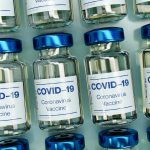 Welcome to the December 2020 update for the Fenland COVID-19 Study which we are sending out to the 3,939 people who are now engaged with this study. Thank you all for your participation and engagement with this research.
Welcome to the December 2020 update for the Fenland COVID-19 Study which we are sending out to the 3,939 people who are now engaged with this study. Thank you all for your participation and engagement with this research.
We hope that this newsletter provides useful and interesting information about our progress with the study which is now closed to new recruitment.
We set the study up earlier in the year when we did not know for sure whether or not there would be a second COVID-19 wave. However, we needed to be in a position to be able to study the potential early detection of asymptomatic disease if a wave occurred. Now that the second wave is upon us and we may even have the possibility of a third wave in early 2021, the study is well positioned to be able to deliver on its ambitions. Thus it is really important for us to help you to continue to collect regular data over the winter months.
We all hope that the roll out of vaccines will happen soon, but until it does, early detection of infection remains an important ambition. Recent publications that are reported below indicate that the approach we are developing in the Fenland study has considerable potential to be fruitful.
In this issue
- With vaccines on their way why is Fenland COVID-19 study still important?
- Checklist – when should I complete my measurements?
- Help on the Huma app
- Antibody test results will now be available at the end of the study
- Frequently asked questions? We have the answers!
With vaccines on their way why is Fenland COVID-19 study still important?
 While we have all been heartened by the promising news about vaccines, the research from Fenland COVID-19 is still very much needed.
While we have all been heartened by the promising news about vaccines, the research from Fenland COVID-19 is still very much needed.
Persistence of antibodies – questions remain
The repeated antibody tests in the study will provide important information about how long the antibodies may persist. Previous studies have made inferences about changes in antibodies from repeat measurements in different people. One large national study reported a decline from 6.0 to 4.4 in the percentage of people having a positive antibody result between late June and September. However, the study did not test the same people each time, and they used a different type of test that might be less accurate than ours.
Repeating tests every three months, together with the other information you are reporting, will help us improve our understanding about changes in antibody status over time, how that change varies between people, and the reasons for this.
Vaccine roll-out will take time
It will take time for vaccines to be rolled out, with those people who are most at risk prioritised to receive a vaccine first. So early detection of the infection before symptoms develop will still be very important to reduce transmission and outbreaks for a while yet.
A recent study in a small group of people reported that changes in resting heart rate were a predictor of COVID-19 before symptoms developed. However, the study concluded that in the future the ability to detect COVID-19 might be improved by combining other measurements, such as body temperature and blood oxygen saturation. This is exactly what we are doing with your help in the Fenland COVID-19 app sub-study.
If you are in the app sub-study, it is important to remain as still as possible when you are taking your resting heart measurements to get a good signal.
Understanding wider impacts
Now that it is clear that the phase of national and local restrictions will continue for some while yet, it is really important that we generate understanding about how COVID-19, and our public health response to it, impact on people’s physical health, mental health and wellbeing. The information you are providing us with on your diet, wellbeing, weight and physical activity is important in helping to understand these wider impacts.
Please continue to complete the regular measures and take the blood tests when these are sent to you. The checklist below should help you with the scheduling of measurements. Do contact us if you have any questions.
Checklist – when should I complete my measurements?
* update any changes to medications and supplement use
Help on the Huma app
 If you are one of the participants who are using the Huma app and you have any queries, there are a number of ways we can help:
If you are one of the participants who are using the Huma app and you have any queries, there are a number of ways we can help:
- Contact the support team using the app chat function. You can find this under the Profile icon and Support. Please only email the support team (support@huma.com) if you are not able to contact them using the chat function. They can reply more quickly via the app chat.
- Don’t forget there is information in the Learn section including Getting started with Huma video and What to do and when?
- We will also be offering Zoom support for those who would prefer to go through their questions with a member of the team demonstrating live on the app. We will arrange daytime and evening appointments. Please contact the study team via fenlandstudy.covid19@mrc-epid.cam.ac.uk if you think this would help you. Please provide details of what the problem is and what type of phone you have.
Keep your app up to date
When you open the app, please look out for notification for app updates. These updates are required when the smartphone platform systems are changed and when changes are made to the app.
Antibody test results will now be available at the end of the study
When we set up the study, we agreed with the ethics committee that we would not provide results back to participants, largely because the antibody measurement approaches were still being developed and we could not guarantee return of results to participants promptly. We were also concerned about possible changes to people’s behaviour on receipt of information based on tests, the performance of which was unknown.
This situation has evolved and therefore we sought and have been granted ethical approval to change our practice. We are pleased to be able to let you know that we can give participants the results of all their antibody tests at the end of the study, should they wish to receive them.
Receiving your antibody results
Early in 2021 we will ask you if you would like to opt in to receive your individual antibody results. There is important information about the interpretation of these test results that is available to read here. You do not need to do anything right now. We will be contacting you with a form in due course.
We will provide more information about progress in setting up the highly novel process to measure antibodies on the dry blood spots in our next newsletter and will provide information about the overall study results from the measurements conducted in this study at baseline. As these blood samples were taken before the emergence of the second wave, they will provide information about how many people in the Fenland study population had evidence of COVID-19 infection from the first wave.
Frequently asked questions? We have the answers!
Our study team receive a number of questions about this study, and we’ve summarised some important points that frequently arise;
- Please do take your blood sample as soon as you receive the device in the post.
- Please complete the questionnaires at your earliest opportunity once you have received the link or reminder.
- Keep the sharps bin for all blood samples over the study period.
- The flu jab does not affect the antibody test, so you do not have to delay taking your blood sample if you have a jab.
- The study team office and labs will be closed over the Christmas period from the end of Wednesday 23 December and re-opening on Monday 4 January. Please do not post your blood sample back during this time. We will reply to any correspondence on our return. For any urgent questions during this period, please call 0800 085 6183 and leave a message and contact details. A member of the study team will contact you.
Thank you for your continued participation in the study. In the next newsletter, we look forward to sharing some of the initial findings from the study with you.
The Fenland Study Team
www.mrc-epid.cam.ac.uk/fenland-covid19/
Tel: 0800 085 6183 (Monday – Friday, 9:00am – 4:00pm)
Email: fenlandstudy.covid19@mrc-epid.cam.ac.uk
Address:
MRC Epidemiology Unit
University of Cambridge School of Clinical Medicine
Box 285
Institute of Metabolic Science
Cambridge Biomedical Campus
Cambridge CB2 0QQ
United Kingdom

 MRC Epidemiology Unit
MRC Epidemiology Unit